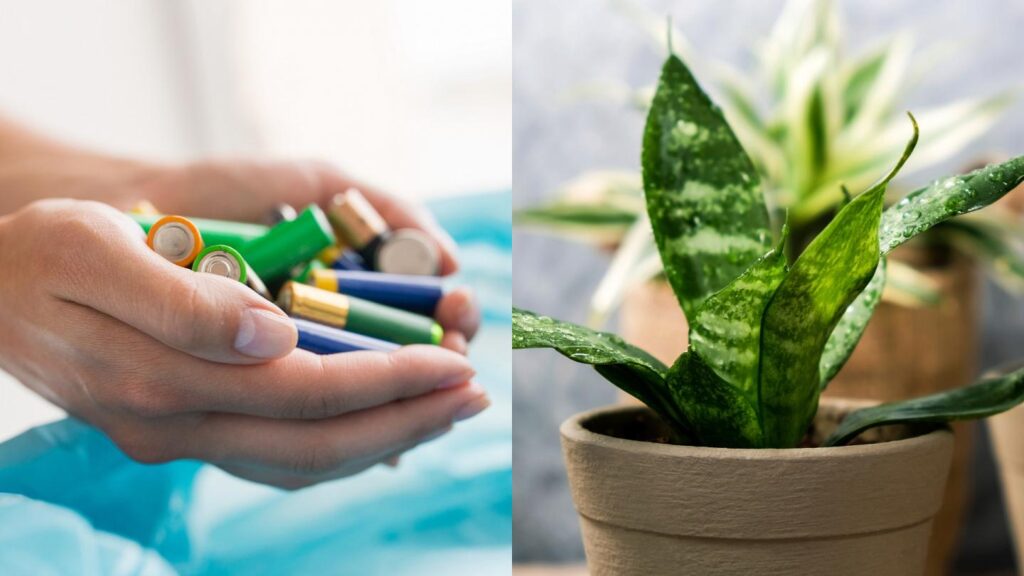Earth is polluted highly with tiny waste materials, which is taken granted of disposal at the first and dumped elsewhere improperly at the last. This includes the batteries, that’s often thrown away after its durability, rather than properly recycled. Batteries in the sense, starting from TV / AC remote batteries to those used in toys for children. The alkaline batteries now pose a serious problem in the world, because of improper handling and dumping.
But then, people have made a possible way to reuse these batteries to feed the plants, as a fertilizer. Seriously? Yeah! I ain’t joking.
Feed your used batteries to plants, instead of disposing them!
An Australian startup company dedicates itself to turn old batteries into fertilizer for crops, putting a period to them being ended up in landfill.
97% of alkaline batteries are not recycled in Australia.
Instead, they mingle with ordinary trashes, which further get dumped into the landfill. This act could possibly take a chance of leakage of chemicals from batteries into the soil, causing land pollution, soil contamination and water pollution.
Generally, batteries are either thrown as solid waste or recycled. While disposing them pose a threat as mentioned above, recycling the batteries asks for extreme heat to melt down the metals inside it to be reused. This melting also leaves the metals like iron, manganese, zinc that got mined from natural resources, unused where they could be being repurposed elsewhere.
Also, recycling of batteries is effectively carried out only in European countries, where the legislation asks the shops that sell batteries to have people to return the used batteries instead of throwing. This means the percentage being recycled is significantly higher, in comparison to Australia & the rest of the world.
A 23-yr Old Indian Engineer’s innovation of generating both Electricity & Water from Wind-turbine <— Don’t miss this to read!
Envirostream concerns this as an opportunity to serve a good purpose for the world, by recycling these batteries with taking the essential ingredients and turning them into something that gonna help the plants to grow.
“Globally, the disposal of alkaline batteries has become a major problem,” said Adrian Griffin, managing director of Lithium Australia, in a press release. “Our plan for repurposing the active components of the spent cells is not only a significant step towards worldwide environmental management of the issue but could also have a powerful influence on the sustainability of disposable batteries.”
Batteries have the food for plants
Although some chemicals in batteries are toxic, this approach sucks the natural or non-toxic metals / nutrients present in alkaline batteries and feeds them to plants.
For example, zinc present in alkaline batteries is vital for the plants to synthesize a chemical called ‘chlorophyll’, which makes them green and aids in photosynthesis. Iron on the other hand plays a role in energy production by plants and manganese is the one responsible for plants’ respiration, nitrogen assimilation, besides helping photosynthesis to occur.
Read this: A London Woman’s startup aims for ‘Zero-waste’ via a business in a retro-styled Milk Truck
The batteries are first crushed, then filtration and purification processes remove toxic elements like mercury and nickel. It is important that these don’t end up in the fertilizer as they could make their way into the food we eat so testing of the final product is rigorous. Once removed, they are sent on to be safely disposed of by hazardous waste treatment plants instead of leaching into the soil as they would if the batteries were sent to landfill.
Trace elements are purified and put safely back into nature as products for farming. Tracegrow, a Finnish company briefs its project similarly as this, and it has finalized in producing a fertilizer for plants & in-fact tested it. So far, the fertilizer has been used on tomatoes, cotton and avocados with good results state the company.
The results show a strategic rise in the growth of plants with this fertilizer being fed.
Epilogue
For the past 50 years, humans are only devoted to the development and upgrade, having minimal concern to the world. But now, as earth paybacks in & as ‘climate-change’, companies are ultimately drifting towards energy-efficiency or ‘zero-waste’ strategy, to reduce the carbon content and to reduce the polluting components being untreated.
Future may bring big value to firms, which push itself for eco-friendly ideas to turn the mother earth back to its original form.
If you have an idea similar to this, don’t hesitate to start! ☻
Referenced from:https://www.euronews.com/living/2020/05/28/don-t-throw-away-old-batteries-feed-them-to-your-plants-instead

